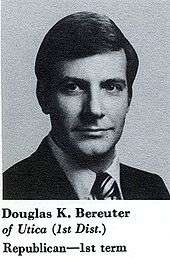Doug Bereuter
Douglas Kent Bereuter (born October 6, 1939) is a retired politician from the state of Nebraska in the Midwestern United States. He served in the United States House of Representatives from 1979 until 2004. He also served as the president and CEO of The Asia Foundation from 2004 to 2010 and is a member of the ReFormers Caucus at Issue One.[1] Bereuter is a member of the Republican Party.
Doug Bereuter | |
|---|---|
 | |
| Member of the U.S. House of Representatives from Nebraska's 1st district | |
| In office January 3, 1979 – August 31, 2004 | |
| Preceded by | Charles Thone |
| Succeeded by | Jeff Fortenberry |
| Member of the Nebraska Legislature | |
| In office 1974–1978 | |
| Personal details | |
| Born | October 6, 1939 York, Nebraska, U.S. |
| Political party | Republican |
| Alma mater | University of Nebraska-Lincoln |
Early life and education
Bereuter was born in York, Nebraska and reared in Utica, Nebraska. After graduation from Utica High School in 1957, he attended the University of Nebraska–Lincoln, where he was a member of Sigma Alpha Epsilon, receiving his B.A. degree in 1961. He then attended Harvard University from 1961 to 1963, receiving his M.C.P degree in 1966. He served as an infantry and intelligence officer in the U.S. Army from 1963 to 1965. After discharge, he returned to Harvard University, earning an M.P.A. from the John F. Kennedy School of Government in 1973.
Career
Bereuter worked as an urban planner with the United States Department of Housing and Urban Development from 1965 to 1966. He was a division director for the Nebraska Department of Economic Development from 1967 to 1968, and from 1968 to 1970 he was director of Nebraska's Office of Planning and Programming.
Political career

Bereuter served in the Nebraska Legislature from 1974 to 1978, when he was elected to the U.S. House of Representatives. He was reelected 12 times without substantive opposition, and never won less than 58 percent of the vote. He served longer in the House than anyone in Nebraska's history, and only George Norris and Carl Curtis served in both chambers longer. He announced in late 2003 that he would not run for a 14th term in 2004, resigning on August 31, 2004 to become president of The Asia Foundation.
He was a member of the Council on Foreign Relations and served on the Financial Services Committee, Committee on International Relations, the Committee on Transportation and Infrastructure, and was the Vice-Chairman on the Select Committee on Intelligence. He was also Chairman of the U.S. House Delegation to the NATO Parliamentary Assembly.
Among the bills that Bereuter sponsored is the Bunning-Bereuter-Blumenauer Flood Insurance Reform Act of 2004. He was co-author of the Bereuter-Levin Amendment, which made possible the passage of the act granting Permanent Normal Trading Relations for China. He was also responsible for starting the USAID Farmer-to-Farmer technical assistance program, which has taken thousands of American volunteers abroad.
Bereuter generally had a moderate voting record; his lifetime American Conservative Union rating was 63. He was sometimes critical of the religious right's influence on the Republican Party. He endorsed Curt Bromm, speaker of the Nebraska Legislature, as his successor in 2004. However, Bromm lost to a considerably more conservative candidate, Jeff Fortenberry.
Shortly before he left Congress, Bereuter released a statement calling the Iraq War, which he had previously supported, "a mistake," and strongly criticized a "massive failure" of pre-war intelligence.[2]
References
- "Issue One – ReFormers Caucus". Retrieved 2019-11-07.
- Barrett, Ted. "Retiring GOP congressman breaks ranks on Iraq". CNN. Archived September 11, 2001, at the Wayback Machine 2004-08-19. Retrieved 2016-01-22.
External links
| Wikisource has original text related to this article: |
| Wikimedia Commons has media related to Doug Bereuter. |

